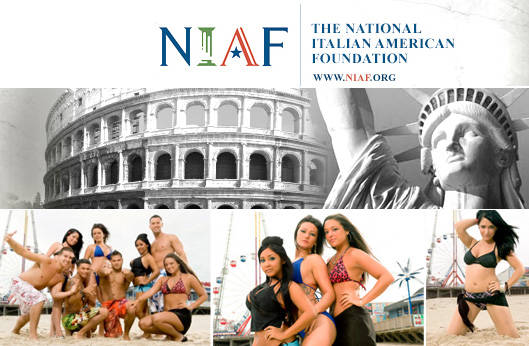National Italian American Foundation Official Statement: MTV’s “Jersey Shore”
With the ending of the MTV’s “Jersey Shore” amid media speculation about a possible second season, the National Italian American Foundation (NIAF) wishes to not only express our continued concerns about this program but also educate the public about the need for accurate depictions of Italian Americans in the media.
When “Jersey Shore” first aired in December, NIAF expressed concerns about this program because it clearly attempted to connect “guido” culture with Italian American identity. This was blatant throughout the program’s narrative, character development and choice of background imagery, which depicted a beach house decorated with maps of Italy and the colors of the Italian flag. As we noted at the time, “guido” is widely viewed as a pejorative term that reinforces negative stereotypes about Italian Americans.
We were pleased that MTV, feeling pressure from the Italian American community and diminishing advertisers, discontinued using the offensive word “guido” in voice-overs and promotional spots. However the deliberate association between Italian American identity and the term “guidos” persisted throughout the season and was unmistakable in the program’s branding and marketing. Moreover, MTV failed to demonstrate that the “guido” trend transcends ethnic lines. Rather than being a manifestation of Italian American identity, it is a youthful expression and lifestyle predominantly visible in the Northeast. This program and its characters had more in common with the adolescent residents of “Animal House” than with Italian Americans.
NIAF objects to MTV’s continued billing of this program as a “reality” show. Its reliance on heavy editing and scripted segments featuring compensated actors pressed into unbecoming behavior renders “Jersey Shore” far from reality. As a nation, we have viewed the progressive degradation of reality shows, which now feature cast members seemingly willing to undergo any humiliation to secure their 15 minutes of fame. Regrettably, 2009 saw a number of incidents – such as the “balloon boy” and the White House State Dinner crashers – where individuals put the safety and well-being of their family or our nation’s leadership at risk for the sake of a chance at reality television.
While there are examples of Italian Americans who sympathize with the characters on “Jersey Shore,” the reality of the Italian American experience is much different. New Jersey’s “reality” of Italian Americans includes Supreme Court Justice Samuel A. Alito, Jr., General Raymond T. Odierno, Bruce Springsteen, and Governor Chris Christie. It also includes a diverse group of white- and blue-collar individuals with varying socio-economic and educational levels who share a common position: that the outrageous behavior evident on “Jersey Shore,” which was laden with promiscuity, debauchery, and violence, was a disgrace.
NIAF previously noted that MTV tapped into a sore spot for many Italian Americans, who have a long history of negative stereotyping in media and are often portrayed as gangsters and buffoons. Many Italian American groups and activists objected to “Jersey Shore,” citing a pattern of Italian defamation in television and film. However, the uproar over this program extended far beyond the Italian American community; even the New Jersey State Legislature, local government officials and tourism agencies weighed in to express their concern. Outrage spread to social networking sites like Facebook, which is home to several pages launched in protest, including, “MTV's ‘Jersey Shore’ Is a Disgrace to the Jersey Shore and Its Inhabitants” – a page that boasts more than 70,000 fans. Actress Alyssa Milano parodied the program in a YouTube video, demonstrating that the viewership of “Jersey Shore” was laughing at the program’s characters and not with them.
NIAF’s problem is with MTV and not the young men and women featured on this program, who one day will grow up and move on with their lives. Many young people behave in an improper manner that they regret later in life but, unlike the cast of MTV’s “Jersey Shore,” their actions are usually not captured on film and rebroadcast on the Internet in perpetuity. MTV is exploiting bad behavior for shock value and ratings.
So, what are the ramifications of “Jersey Shore” and why should we take this seriously? Those working within public relations and communications wisely recognize that perception is reality. Herein lies the problem of “Jersey Shore”: it portrays the program’s characters as representative of the Italian American community. This is simply not accurate and its prevalence in the media is damaging to Italian American identity. Television personality Joy Behar perceptively remarked, “It makes it hard for young Italian Americans to be taken seriously in the work force.” This concern is even more salient in places around the country where there are few Italian Americans.
We as Italian Americans must acknowledge that some within our community adhere to and embrace “guido” culture. This is a small group, which has captured the nation’s attention. But we also must acknowledge that MTV’s program sends a harmful message that permeates pop culture, damaging the image and sensibilities of Italian Americans as a group. Italian Americans, the Garden State and the Jersey Shore deserve better.
The National Italian American Foundation (NIAF) is a nonprofit, nonpartisan educational foundation that promotes Italian American culture and heritage and is committed to promoting a positive image of Italian Americans. A centerpiece of NIAF’s mission is recognizing the many significant contributions of Italian Americans to our nation in a variety of areas including business, government, entertainment, education, science, medicine, and law.


































i-Italy
Facebook
Google+
This work may not be reproduced, in whole or in part, without prior written permission.
Questo lavoro non può essere riprodotto, in tutto o in parte, senza permesso scritto.